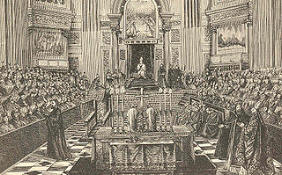
The Decrees Of The Vatican Council
CANONS
I. Of God the Creator of all things
1. IF anyone shall deny One true GOD, Creator and Lord of things visible and invisible, let him be anathema.
2. If anyone shall not be ashamed to affirm that, except matter, nothing exists, let him be anathema.
3. If anyone shall say that the substance and essence of GOD and of all things is one and the same, let him be anathema.
4. If anyone shall say that finite things, both corporeal and spiritual, or at least spiritual, have emanated from the divine substance; or that the divine essence by the manifestation and evolution of itself becomes all things; or, lastly, that GOD is universal or indefinite being, which by determining itself constitutes the universality of things, distinct according to kinds (genera), species and individuals; let him be anathema.
5. If anyone confess not that the world, and all things which are contained in it, both spiritual and material, have been, in their whole substance, produced by GOD out of nothing; or shall say that GOD created, not by His will, free from all necessity, but by a necessity equal to the necessity whereby He loves Himself; or shall deny that the world was made for the glory of GOD; let him be anathema.
II. Of Revelation
1. IF anyone shall say that the One true GOD, our Creator and LORD, cannot be certainly known by the natural light of human reason through created things; let him be anathema.
2. If anyone shall say that it is impossible or inexpedient that man should be taught by the divine revelation concerning GOD and the worship to be paid by him; let him be anathema.
3. If anyone shall say that man cannot be raised by divine power to a higher than natural knowledge and perfection, but can and ought, by a continuous progress, to arrive at length of himself to the possession of all that is true and good; let him be anathema.
4. If anyone shall not receive as sacred and canonical the books of Holy Scripture, entire with all their parts, as the holy Synod of Trent has enumerated them, or shall deny that they have been divinely inspired; let him be anathema.
III. Of Faith
1. IF anyone shall say that human reason is so independent that faith cannot be enjoined upon it by GOD; let him be anathema.
2. If anyone shall say that divine faith is not distinguished from natural knowledge of GOD and of moral truths, and therefore that it is not requisite for divine faith that revealed truth be believed because of the authority of GOD who reveals it; let him be anathema.
3. If anyone shall say that divine revelation cannot be made credible by outward signs, and therefore that men ought to be moved to faith solely by the internal experience of each, or by private inspiration; let him be anathema.
4. If anyone shall say that miracles are impossible, and therefore that all the accounts regarding them, even those contained in Holy Scripture, are to be dismissed as fabulous or mythical; or that miracles can never be known with certainty, and that the divine origin of Christianity is not rightly proved by them; let him be anathema.
5. If anyone shall say that the assent of Christian faith is not a free act, but necessarily produced by the arguments of human reason; or that the grace of GOD is necessary for that living faith only which worketh by charity; let him be anathema.
6. If anyone shall say that the condition of the faithful and of those who have not yet attained to the only true faith is on a par, so that Catholics may have just cause for doubting, with suspended assent, the faith which they have already received under the teaching (magisterio) of the Church, until they shall have obtained a scientific demonstration of the credibility and truth of their faith; let him be anathema.
IV. Of Faith and Reason
1. IF anyone shall say that in divine revelation there are no mysteries, truly and properly so called, but that all the doctrines of faith can be understood and demonstrated from natural principles by properly cultivated reason; let him be anathema.
2. If anyone shall say that human sciences are to be so freely treated, that their assertions, although opposed to revealed doctrine, can be held as true, and cannot be condemned by the Church; let him be anathema.
3. If anyone shall assert it to be possible that sometimes, according to the progress of science, a sense is to be given to doctrines propounded by the Church different from that which the Church has understood and understands; let him be anathema.
Therefore, fulfilling the duty of Our supreme pastoral office by the mercies of JESUS CHRIST, We entreat, and by the authority of the same Our GOD and SAVIOUR We command, all the faithful of CHRIST, and especially those who are set over others or are charged with the office of instruction, that they earnestly and diligently apply themselves to ward off and eliminate these errors from Holy Church, and to spread the light of pure faith.
And since it is not sufficient to shun heretical pravity, unless those errors also be diligently avoided which more or less nearly approach it, We admonish all men of the further duty of observing the Constitutions and Decrees by which such erroneous opinions as are not here expressly enumerated have been proscribed and condemned by the Holy See.
Given at Rome in public session, solemnly held in the Vatican Basilica in the year of our LORD one thousand eight hundred and seventy, on the twenty-fourth day of April, in the twenty-fourth year of Our Pontificate.
In conformity with the original.
JOSEPH, BISHOP OF ST POLTEN,
Secretary to the Vatican Council.

 Support Site Improvements
Support Site Improvements